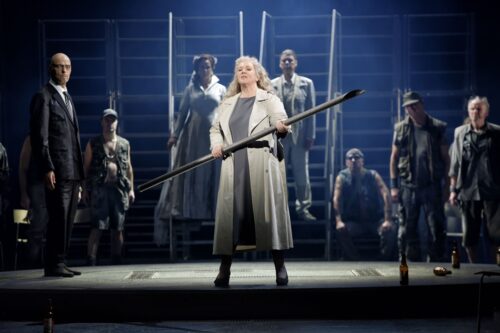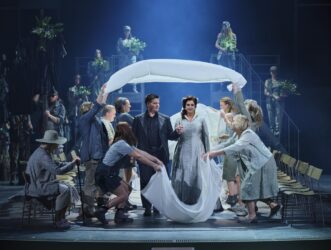 Sweden Wagner, Götterdämmerung (Swedish: Ragnarök): Soloists of Gothenburg Opera, Chorus and Orchestra of Gothenburg Opera / Evan Rogister (conductor). Gothenburg Opera main stage, 5.12.2021. (NS)
Sweden Wagner, Götterdämmerung (Swedish: Ragnarök): Soloists of Gothenburg Opera, Chorus and Orchestra of Gothenburg Opera / Evan Rogister (conductor). Gothenburg Opera main stage, 5.12.2021. (NS)

Production:
Director – Stephen Langridge
Set and Costume design – Alison Chitty
Set and Costume design assistant – Fabrice Serafino
Lighting design – Paul Pyant
Movement instructor – Annika Lindqvist
Cast:
Siegfried – Daniel Brenna
Gunther – Mats Persson
Hagen – Mats Almgren
Alberich – Ólafur Sigurdarson
Brünnhilde – AnnLouice Lögdlund
Gutrune – Carolina Sandgren
Waltraute – Katarina Karnéus
First Norn – Hege Høisæter
Second Norn – Katarina Giotas
Third Norn – Charlotta Larsson
Woglinde – Mia Karlsson
Wellgunde – Frida Engström
Flosshilde – Ann-Kristin Jones
Wotan (silent role) – Anders Lorentzson
Erda (silent role) – Hege Høisæter
The Seven Narrators (silent roles) – Sara Suneson (The Golden Child), Sara Wikström (Grimhild), Julie Dariosecq, Jérôme Delbey, Jonathan Böiers, Martin Mossberg, Ida On
‘I’m sorry, I shouldn’t speak in the middle of a performance, but it’s so incredible to have you here live!’ Evan Rogister’s irrepressible exclamation to the audience before he lifted his baton to conduct Act II of Götterdämmerung seemed to speak for the feelings of the whole opera house at the premiere of the concluding part of Gothenburg Opera’s first full Ring cycle. Stephen Langridge and his superb creative team have held the four-year cycle together despite being forced by the pandemic to produce a socially-distanced and online-only Siegfried (review click here) last season.
All three previous parts were filmed and the films were shown publicly in the week before the premiere of Götterdämmerung, allowing me and other afficionados to refresh their memory. Alison Chitty and Fabrice Serafino’s set has been an essential connection between the different parts of the Ring, with the recycled wood walls becoming progressively more battered and holed as Wagner’s world hurtles from natural balance before the theft of the Rhinegold, to doomed love in Die Walküre and the physical and moral junkyards of Siegfried. In Götterdämmerung the back wall of the set is largely gone, allowing a new backdrop for Paul Pyant’s lighting, in particular a sweltering orange light for the Gibichung Hall in the first act vividly evoking a globally heated Rhine valley.
Removing the back wall of the set did however make the acoustic more difficult for the singers, especially at moments when they were set back from the pit and above the stage level, but fortunately this was not a frequent problem. A very interesting choice was to have not only Wotan (Anders Lorentzson) silently onstage at key moments but also Gunther, Gutrune and Hagen’s mother Grimhild (Sara Wikström), last seen as a beautiful young woman being defiled by Alberich in Das Rheingold, now a crotchety but respected old lady. In an utterly gripping scene at the beginning of Act II, Alberich hands a spear to Grimhild who places it in Hagen’s hand during his sleep while Alberich is urging him to kill Siegfried and take the ring.
Ólafur Sigurdarson was terrific as Alberich in this his only scene, communicating both his malevolence and his vulnerability now that he has to rely on his son, who like all of the other protagonists has his own agenda. Stephen Langridge writes in the programme that ‘Götterdämmerung is a fundamentally human story’, where neither fate nor divine intervention control events. That said, this human society is riven with greed and violence – the Gibichung army was the most ruffianly collection of soldiers that I have ever seen on a stage but their leaders lived a life of luxury and are obsessed with wealth and status. The reinforced Gothenburg Opera Chorus sounded terrific, both in boisterous fortissimo and the beautiful pianissimo on welcoming Brünnhilde. They were also well-choreographed, with the Gibichung women playing an active part onstage even though Wagner did not give them much to sing.

Mats Persson brought out Gunther’s mix of ambition and insecurity very well, his voice nimbly switching between statesmanlike when addressing his troops to self-pitying as he finds himself caught up in the coils of Hagen’s scheme. Carolina Sandgren made a believable Gutrune, developing genuine feelings for Siegfried. Mats Almgren was a revelation as Hagen – his voice lacks raw power but he played Hagen as a skilled manipulator, whose primary weapons are his crafty turn of phrase and his deep knowledge rather than his spear. This suited his dark and resonant voice perfectly, and his acting skillfully let Hagen’s corrosive hatred seep through.
In this production the costumes tended towards 50 shades of drab, which combined with a backdrop that was usually grey sometimes felt rather flat. The colourful costumes and facepaint of the Rhinemaidens were a welcome change, though in keeping with the theme of destruction of nature through greed they were festooned with plastic and fishing nets. The – by turns seductive and ominous – singing of Mia Karlsson, Frida Engström and Ann-Kristin Jones was every bit as good as in Das Rheingold. The Norns (Hege Høisæter, Katarina Giotas and Charlotta Larsson) were rich in vocal talent but were depicted as bald, bespectacled, wearing white lab coats and saddled with direction requiring strange jerky movements. Fortunately such questionable directorial decisions were rare (the other one that confused me was Hagen delivering his magic potion by injection into Siegfried’s neck).
The chemistry between Siegfried (Daniel Brenna) and Brünnhilde (AnnLouice Lögdlund) in the first act was delightful, the sometimes-overheated romanticism of their lines being leavened by a physical playfulness. Brenna’s Siegfried is still boyish and bumptious, though with a golden Heldentenor showing great warmth as well as volume. This bumptiousness has the downside of contempt for people Siegfried decides he doesn’t like – such as Brünnhilde after Hagen’s potion has erased her from his memory. This helped give the confrontation between Siegfried and Brünnhilde in Act II a searing emotional intensity and makes Brünnhilde’s betrayal of Siegfried’s only physical weakness to Hagen more understandable.
AnnLouice Lögdlund debuted as Brünnhilde ten years ago in the Wermland Opera Ring (review click here), but her voice retains the same radiance and strength that struck me then. Her acting combined with her vocal technique made her gripping whenever she was onstage. In her scene with Waltraute (Katarina Karnéus) two glorious voices were combined, both equally passionate though with opposite aims. And Lögdlund was magnificent in the immolation scene, displaying great emotional and dynamic range (she sang ‘Ruhe, ruhe, du Gott’ so softly yet with great dignity) and morally dominating the stage.
In short, the Gothenburg Opera has assembled a cast with no weak links. The same can be said of the orchestra, which played at a consistently high level and was justly given enthusiastic applause between the acts. Evan Rogister’s sense of architecture and pacing was excellent, driving the music forward but never rushing, and skillfully varying dynamics. Orchestral set-pieces such as Siegfried’s Funeral Music were thrilling, but the singers were also ably supported. In many ways this production is a product of the joy of storytelling and glorious music, and joy and rebirth were reflected in the final scene.
Niklas Smith
Playing until 9 January 2022, for more information and tickets see the Gothenburg Opera website. The premiere was recorded for Swedish Radio and is available to listen to until about 10 January 2022 on the Swedish Radio website and the SR Play app.
